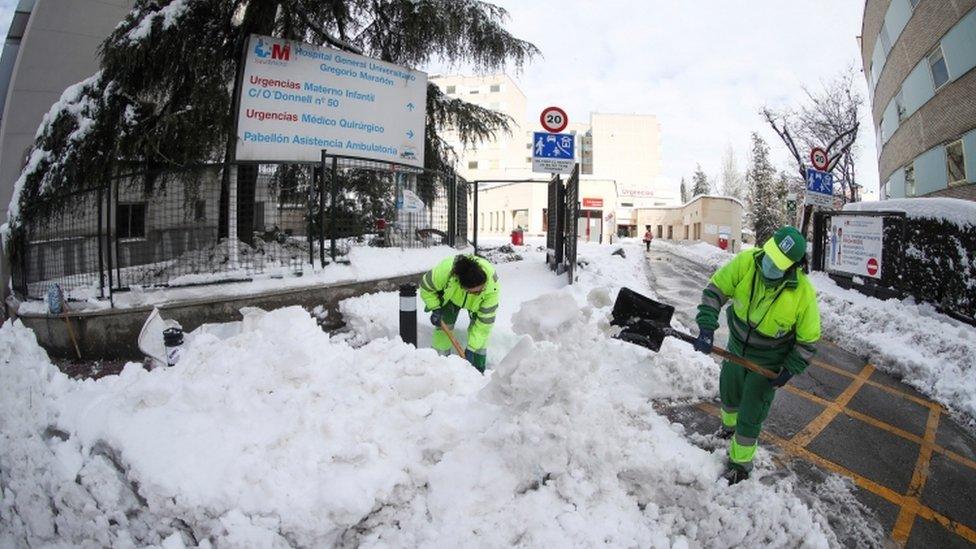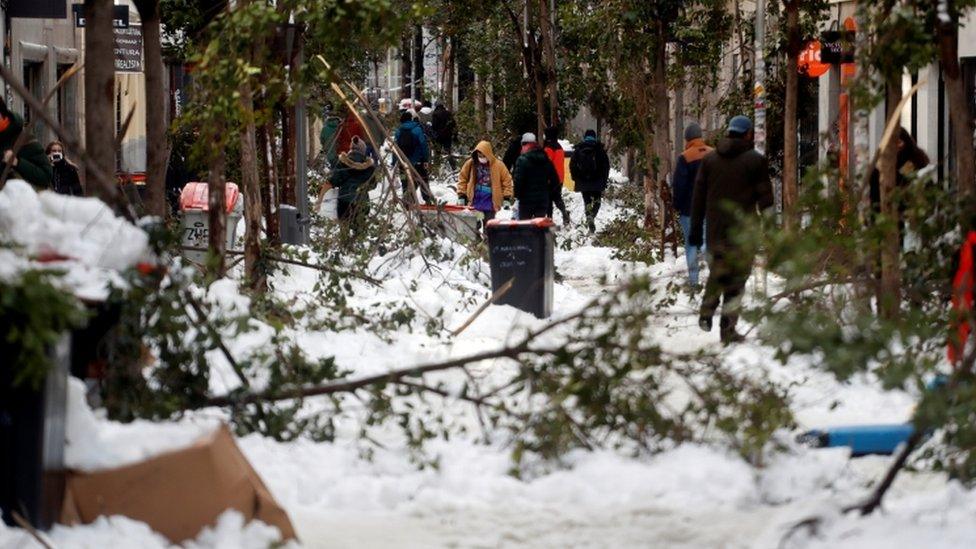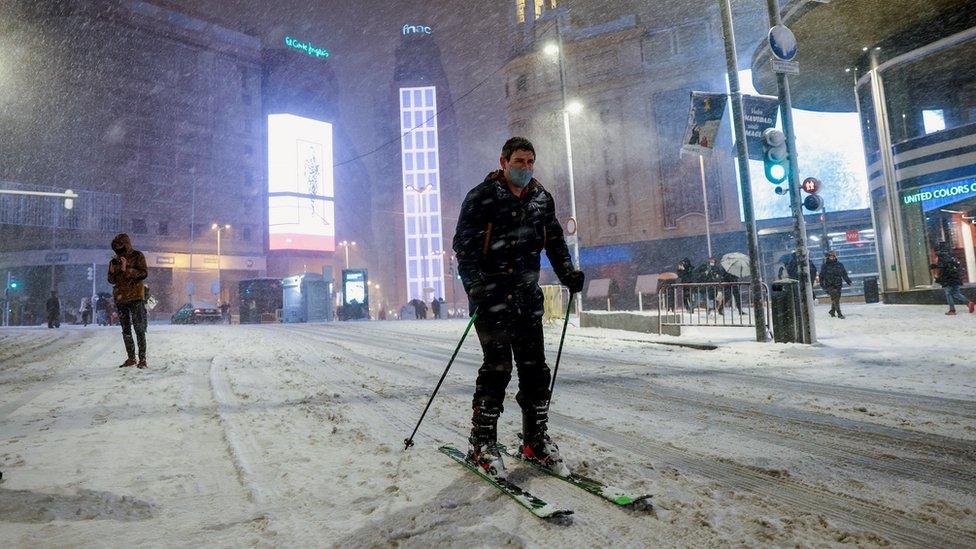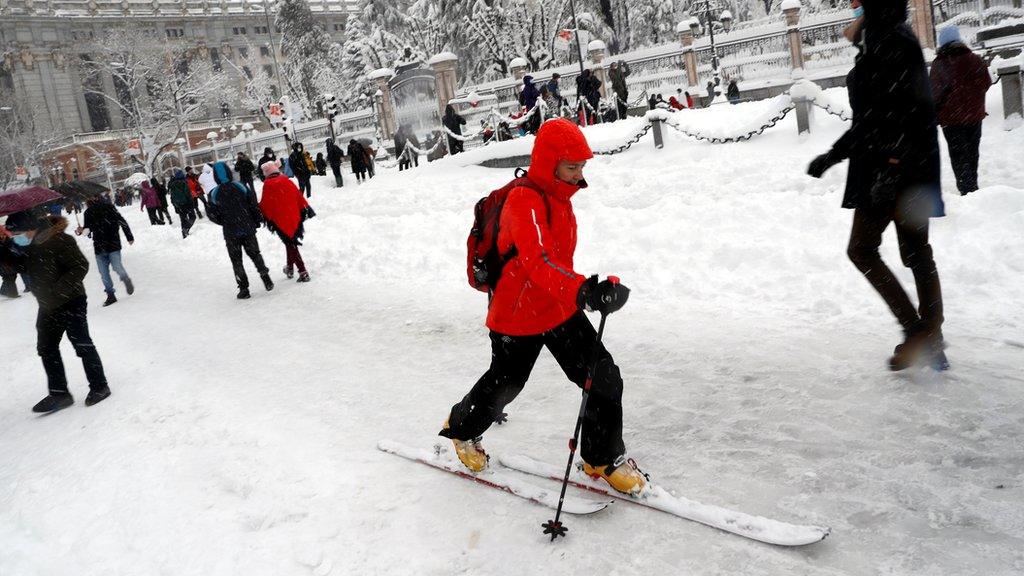Storm Filomena: Spain races to clear snow as temperatures plunge
- Published

Workers in Madrid clear a hospital entrance of snow
Spain is in a race against time to clear roads covered by heavy snow, and get Covid vaccines and food supplies to areas affected by Storm Filomena.
Up to 50cm (20 inches) of snow fell on the capital Madrid, one of the worst hit areas, between Friday and Saturday.
At least four people died and thousands of travellers were left stranded.
Overnight, temperatures plunged to -8C (18F) in parts of Spain, amid warnings by meteorologists that the snow was turning to perilous ice.
The unusual cold wave on the Iberian peninsula is expected to last until Thursday.
The Spanish government said it had taken extra steps - including police-escorted convoys - to ensure its expected shipment of some 300,000 coronavirus vaccines can be distributed as planned to regional health authorities later on Monday.
"The commitment is to guarantee the supply of health, vaccines and food. Corridors have been opened to deliver the goods," Transport Minister Jose Luis Abalos said on Sunday.
Madrid has been hit by heavy snowfall after Storm Filomena
Soldiers have been deployed to clear some of the 700 major roads.
Some 3,500 tonnes of salt were later brought on lorries to the capital, Spain's El Mundo website reported on Monday.

Coronavirus concerns compounded

The record-breaking snowfall has triggered some unprecedented scenes here in Madrid. People have skied along the city's main commercial street, Gran Vía, and one man was pictured being pulled through the district of Hortaleza on a sled by five huskies.
But other responses to the snow have been more controversial due to concerns about Covid-19. Dozens of young people had a snowball fight in Callao square, for example, and many of them were without facemasks.
Nearby, in Puerta del Sol, others celebrated the snow by dancing a conga. The daily Marca newspaper branded it "the conga of shame".
Although the snowfall has now stopped, low temperatures have left snow and ice piled up across the capital and the surrounding region. And with residents advised to avoid using their cars, public transport has seen a surge in demand.
This has compounded coronavirus concerns as many metro train carriages were packed at rush hour on Monday morning, making social distancing impossible.

Madrid's international airport began gradually resuming operations on Sunday afternoon, having cancelled all flights on Friday.
Some 500 people across the Madrid region were forced to spend the night in temporary shelter, including sports centres, after they were trapped by the whiteout.
About 100 shoppers and staff spent two nights at a shopping centre in Majadahonda, a town north of the capital. "There are people sleeping on the ground on cardboard," one restaurant employee told TVE television.

Spain's Meteorological Agency said Saturday's snowfall was the heaviest in Madrid since 1971
But there were stories of heroism too, including doctors and medical workers who abandoned their cars and walked for hours to get to work. One doctor, Alvaro Sanchez, said on social media he had walked 17km (10 miles) over nearly two hours to get to work, while two nurses, Paco and Monica, said they had walked 22km to their hospital.
They were praised by Spanish Health Minister Salvador Illa, who tweeted: "The commitment that the entire group of health workers is showing is an example of solidarity and dedication."
Some 4x4 vehicle owners offered to transport medical workers, while other volunteers helped to clear hospital entrance ways.
"Health staff have been working (hard) for more than a year and this is just a short moment for us, so as citizens, we are trying to help; it is everyone's responsibility," said Fernando de la Fuente, 60, who helped clear the entrance to Madrid's Gregorio Maranon Hospital.
Storm Filomena hits Spain
Spaniards in large parts of the country have been warned to take care in the coming days as temperatures could fall to -12C (10F) in some areas until Thursday.
- Published9 January 2021

- Published9 January 2021
